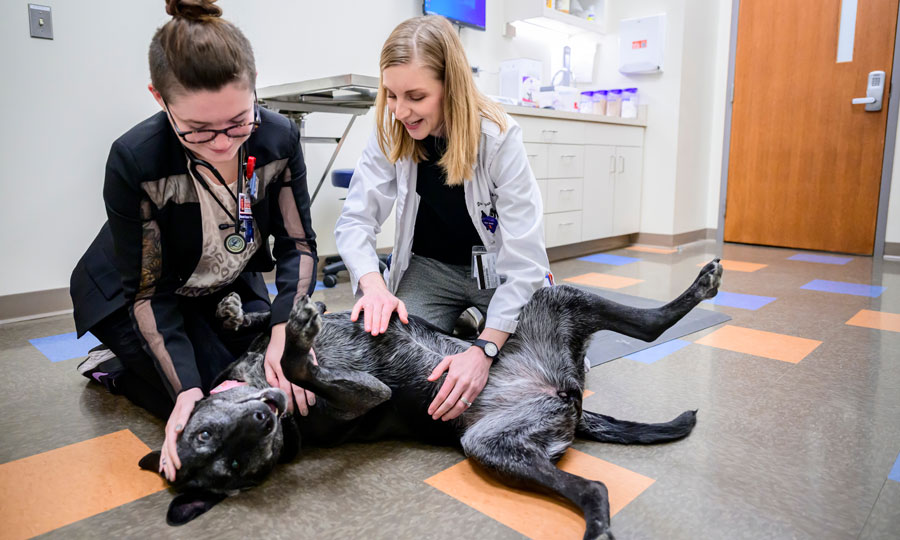Taking a quick trip to the pet store can be challenging, given the myriad of options now available. In particular, there is a confusing and even frustrating array of diets for our canine companions. Dr. Gene Pavlovsky, medical director of the University of Illinois Veterinary Medicine South Clinic in Urbana, has advice for owners about picking a diet that’s right for their dog.
Possible Risks of Boutique Diets
In recent years, many pet food brands have advertised themselves as being grain-free and have even linked such a diet to being better than grain-inclusive ones. However, in 2018, the US Food and Drug Administration issued an alert about increasing cases of dilated cardiomyopathy (DCM) developing in dogs that were otherwise not genetically predisposed to the condition.
“A common thread linking these dogs was the consumption of certain diets, including some boutique, exotic, or grain-free commercial formulations,” says Dr. Pavlovsky. “Improvement in the affected dogs’ hearts after a diet change [away from a boutique/grain-free one] was an important part of what alerted veterinarians to the potential cause.”
Yet, the DCM-boutique diet link is not as straightforward as a single ingredient.
“Not all dogs with diet-associated DCM had been eating strictly grain-free diets,” says Dr. Pavlovsky. “The current data implicates diets containing high levels of pulse ingredients (seeds of legumes, such as peas, chickpeas, lentils, and beans). Less commonly, potatoes or sweet potatoes have been linked to diet-associated DCM, whether the diet was grain-free or not.”
Still, it is important to note that diets labeled grain-free are more likely than conventional diets to contain the ingredients listed above as a carbohydrate source.
What Is Canine Dilated Cardiomyopathy?
“DCM is a condition that involves gradual thinning of the heart muscle, resulting in enlargement and weakening of the heart,“ says Dr. Pavlovsky. It is the second most common type of heart disease in dogs. While the condition has a genetic component, especially in breeds such as Doberman pinschers, boxers, and great Danes, it can also develop in any breed.
Dogs with DCM may show no clinical signs or only mild signs initially. However, coughing, exercise intolerance, or the development of an arrhythmia—an abnormal heart rhythm—can be associated with DCM, according to Dr. Pavlovsky.
Picking a Diet
To help owners navigate the abundance of choices in the dog food aisle, Dr. Pavlovsky advises, “Look for diets that have been tested via feeding trials in accordance with the guidelines developed by the American Association of Feed Control Officials. Choose a diet developed for a specific life stage of your pet, such as puppy or adult.”
Dr. Pavlovsky says that diets created by companies that take part in veterinary nutrition-related research and that employ veterinary nutrition experts are likely to be of higher quality. A sampling of brands that fulfill those criteria includes Hill’s, Purina, and Royal Canin.
“Stay away from products making grand statements or claims that seem too good to be true,” advises Dr. Pavlovsky. “These diets are good for attracting customers but are rarely rooted in solid science.”
Additionally, homemade diets and raw meat-based diets may carry significant health risks for pets. Homemade diets are often nutritionally incomplete and can result in long-term nutritional deficiencies or excesses, especially in growing animals.
“If a homemade diet appeals to a pet owner, a board-certified veterinary nutritionist should be consulted to help formulate a complete and balanced diet,” says Dr. Pavlovsky.
Raw meat-based diets increase the risks of bacterial and parasitic pathogens, not only for the animals eating the diet but also for the people living in the home, he warns.
“Science is ever evolving, and what we know and believe now may change,” says Dr. Pavlovsky. However, by partnering with your veterinarian to choose the best diet for each individual pet, you can ensure that your pet is eating a diet that is rooted in the most current scientific research and knowledge available.
By Sarah Brink
Feature photo by Gayatri Malhotra on Unsplash




